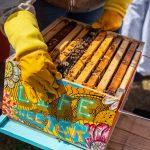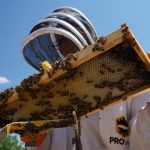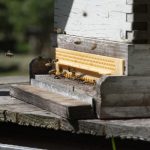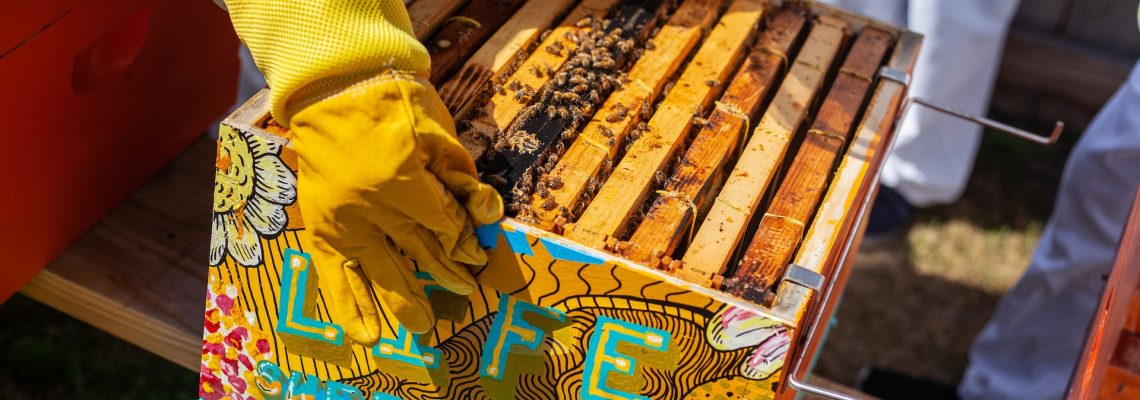Welcome to the buzzing world of honey bee hive business!
If you are passionate about nature and interested in starting your own business, this could be the perfect opportunity for you. Not only is beekeeping a rewarding and satisfying hobby, but it can also be a lucrative source of income.
As you probably already know, honey bees are essential to the pollination of crops, plants, and flowers. The delicious honey they produce is also in high demand by consumers all over the world. This means that there is a growing market for high-quality honey bee products, including honey, beeswax, pollen, and royal jelly.
Create a sustainable and eco-friendly practice
By starting your own honey bee hive business, you can provide your local community with these valuable products while also helping to support the environment. Plus, beekeeping is a sustainable and eco-friendly practice that is becoming increasingly popular among consumers who are looking for natural, organic, and locally sourced products.
With the right marketing strategy, you can build a strong and loyal customer base for your honey bee hive business. By highlighting the unique benefits of your products, such as their natural and sustainable qualities, you can attract customers who are looking for high-quality and ethical products.
So why not take the plunge and start your own honey bee hive business today?
With hard work, dedication, and a passion for nature, you can create a thriving business that benefits both you and the environment.
Main reasons to start a Honey bee hive business
Starting a honey bee hive business can be an exciting and rewarding venture, whether you’re a seasoned beekeeper or just starting out. Not only does beekeeping provide delicious honey and other valuable products, but it also supports the environment and contributes to the local community. Here are some of the main reasons to consider starting your own honey bee hive business:
A growing market for honey bee products
The demand for honey, beeswax, pollen, and royal jelly continues to increase due to their many health benefits and unique flavor profiles. Honey, for example, is a natural sweetener that can be used in a variety of recipes and has been shown to have antibacterial properties. Beeswax can be used in candles, cosmetics, and even as a natural alternative to plastic wraps. As the demand for these products grows, starting a honey bee hive business can be a great way to tap into this market.
Essential to pollination
Honey bees play a crucial role in the pollination of crops, plants, and flowers. In fact, it’s estimated that bees pollinate one-third of the food we eat. Without honey bees, many of our favorite fruits and vegetables would be much more difficult to grow, resulting in a lower yield and higher costs. By starting a honey bee hive business, you can help support agriculture and food production while also enjoying the many benefits of beekeeping.
Sustainable and eco-friendly
Beekeeping is a sustainable and eco-friendly practice that is becoming increasingly popular among consumers who are looking for natural, organic, and locally sourced products. Bees not only provide us with delicious honey, but they also play a crucial role in the ecosystem by pollinating plants and flowers. Beekeeping can also be a way to reduce your carbon footprint by promoting local and sustainable agriculture.
A rewarding hobby
Beekeeping can be a satisfying and enjoyable hobby that allows you to connect with nature and learn about the fascinating world of honey bees. As you care for your bees and watch them thrive, you’ll gain a deeper appreciation for their importance and the natural world around you. Plus, beekeeping can be a great way to relax and de-stress, making it an ideal hobby for those who want to escape the hustle and bustle of everyday life.
Low start-up costs
Compared to other types of businesses, beekeeping has relatively low start-up costs, making it an accessible option for those looking to start a business. While there are some initial expenses such as purchasing equipment and bees, beekeeping requires relatively little ongoing investment, making it an ideal option for those on a budget.
Community impact
Beekeeping can have a positive impact on the local community by providing valuable products, supporting the environment, and educating others about the importance of honey bees. By selling your honey and other products locally, you can help support the local economy and provide your community with high-quality, sustainable products. Beekeeping can also be a way to educate others about the importance of honey bees and the role they play in our food system and environment.
Steps on how to start a Honey Bee Hive business
Learn about honey bees
Learning about honey bees is an essential step in starting a honey bee hive business. It’s important to understand the biology and behavior of honey bees in order to provide them with the best possible care and to ensure their health and well-being. You can start by reading books and articles on beekeeping and honey bees to gain a basic understanding of the topic.
If you’re new to beekeeping, taking a beekeeping course or attending a workshop can be a great way to learn about best practices and gain hands-on experience. Many local beekeeping associations offer beginner courses or workshops, and these can be a great way to connect with other beekeepers in your area and get started with the hobby.
In addition to learning about honey bees, it’s important to understand the environmental factors that can affect their health and well-being. This includes understanding the impact of pesticides and other chemicals on bees, as well as the importance of providing access to food and water sources.
By taking the time to learn about honey bees and beekeeping best practices, you’ll be better equipped to start a successful honey bee hive business and provide your bees with the care and attention they need to thrive.
Choose a location
Choosing the right location for your honey bee hives is a critical step in starting a successful honey bee hive business. You’ll need to select a location that provides access to food and water sources for your bees, as well as a suitable environment for them to thrive.
Setup in your own backyard
One option is to keep your hives in your own backyard, assuming you have the space and local regulations allow for beekeeping. This can be a convenient and cost-effective option, as you’ll have easy access to your hives and won’t need to pay for additional space. However, it’s important to consider whether your yard provides adequate food sources for your bees and whether your neighbors are comfortable with having bees nearby.
Find an alternative location
If you don’t have space in your own backyard, you may be able to keep your hives on a nearby farm or other rural property. This can provide your bees with access to a wider range of food sources, including flowering crops and wildflowers. Be sure to obtain permission from the landowner and consider whether the location provides adequate protection from predators and harsh weather conditions.
Consider the climate and weather conditions
When selecting a location for your hives, it’s also important to consider the climate and weather conditions in your area. Bees need a consistent temperature range and protection from harsh winds and extreme temperatures. In addition, you’ll want to select a location that is easily accessible so that you can regularly check on and maintain your hives.
By taking the time to carefully choose the location for your honey bee hives, you’ll be able to provide your bees with the best possible environment and set yourself up for success in your honey bee hive business.
Obtain equipment
Obtaining the right equipment is essential for starting a honey bee hive business. You’ll need to invest in high-quality beekeeping equipment to ensure that you can provide your bees with the best possible care and protection.
Some of the essential equipment that you’ll need to purchase includes:
- beekeeping suits,
- gloves, and veils to protect yourself from bee stings.
- A smoker is also necessary to help calm the bees while you’re working in the hive.
You’ll also need to invest in hives and frames to provide your bees with a suitable living environment. There are many different types of hives to choose from, including:
- Langstroth
- Top-Bar, and
- Warre hives.
You’ll need to select the type of hive that best suits your needs and the needs of your bees.
In addition to the basic equipment, you’ll also need to purchase tools for working with your bees, such as
- hive tools
- bee brushes, and
- feeders
These tools will help you to manage your hives effectively and ensure that your bees have access to the food and water they need to thrive.
You can purchase beekeeping equipment online or from a local beekeeping supply store. When selecting equipment, be sure to choose high-quality products that are designed for beekeeping. This will help ensure that you can provide your bees with the best possible care and protection and set yourself up for success in your honey bee hive business.
Purchase bees
Once you have obtained the necessary equipment, the next step in starting a honey bee hive business is to purchase your bees. It’s important to purchase your bees from a reputable source to ensure that you receive healthy bees that are free from disease.
There are several options when it comes to purchasing bees. One option is to purchase package bees, which are typically sold in a screened box containing around 3 pounds of bees and a queen. Package bees are a popular option for new beekeepers, as they are relatively inexpensive and easy to install in a hive.
Another option is to purchase nucs, or nucleus colonies. Nucs are small colonies that typically consist of 3-5 frames of bees, brood, and a queen. Nucs are more expensive than package bees, but they are a good option for beekeepers who want to start with a stronger colony.
Finally, you can also purchase a full hive from an established beekeeper. This is typically the most expensive option, but it can be a good choice for beekeepers who want to start with a larger colony that is already established and producing honey.
When purchasing bees, be sure to select a reputable source that provides healthy bees that are free from disease. Local beekeeping associations can be a good resource for finding reputable bee suppliers in your area. Additionally, be sure to choose bees that are well-suited to your climate and that have a good reputation for producing honey.
By purchasing healthy, high-quality bees, you’ll be able to set yourself up for success in your honey bee hive business and ensure that your bees are able to thrive and produce delicious honey.
Install your bees
Installing your bees is an important step in starting a honey bee hive business. It’s important to do this carefully to avoid harming your bees and to ensure that they have a good start in their new home.
Before installing your bees, make sure that your hive is properly set up with frames and foundation. This will provide a stable and safe environment for your bees. Be sure to wear protective gear such as a bee suit, gloves, and veil to protect yourself from bee stings.
To install your bees, you’ll need to carefully transfer them from their package or nuc into the hive. If you’re using a package, you’ll need to remove the queen cage and gently shake the bees into the hive. If you’re using a nuc, simply transfer the frames of bees and brood into the hive.
Provide access to food and water
Once the bees are in the hive, you’ll need to ensure that they have access to food and water. Bees need a source of nectar and pollen to feed on, so be sure to place the hive in an area with plenty of flowers and plants. You can also provide your bees with sugar syrup to supplement their food source.
After installing your bees, it’s important to check on them regularly to ensure that they are healthy and thriving. This will involve inspecting the hive for signs of disease, monitoring the honey production, and providing any necessary care such as treating for mites or pests.
By carefully installing your bees and providing them with the necessary care and attention, you’ll be able to ensure that they have a good start in their new home and set yourself up for success in your honey bee hive business.
Provide care and maintenance
Providing ongoing care and maintenance is an essential part of running a successful honey bee hive business. Beekeeping involves a lot of responsibility, and it’s important to stay on top of your hive’s health and well-being to ensure that your bees are able to produce healthy and delicious honey.
One important aspect of beekeeping is feeding your bees. Bees need a source of nectar and pollen to feed on, and it’s important to ensure that they have access to a steady supply of food throughout the year. This may involve planting flowers and plants that provide nectar and pollen, or supplementing their food with sugar syrup or pollen patties.
Monitor the hive and the bees health
Another important aspect of beekeeping is monitoring your hive’s health. This will involve regular inspections of the hive to check for signs of disease, pests, and other issues. Common pests that affect honey bee hives include:
- mites
- beetles
- and moths
It’s important to take steps to manage these pests to prevent damage to your hive.
Disease prevention
In addition to pest management, you’ll also need to take steps to prevent and treat diseases that can affect your bees. This may involve using treatments such as antibiotics or organic acids to manage diseases like foulbrood or nosema.
Finally, it’s important to manage your hive’s growth and reproduction to prevent overcrowding and swarming. This may involve splitting your hive into multiple colonies or adding additional boxes to accommodate your bees’ growing population.
By providing ongoing care and maintenance, you’ll be able to ensure that your bees are healthy and productive, and that your honey bee hive business is a success. Beekeeping can be a rewarding and fulfilling hobby or business, and with the right care and attention, your bees will be able to thrive and produce delicious honey for years to come.
Harvest honey
Harvesting honey is one of the most exciting and rewarding parts of running a honey bee hive business. Once your bees have established themselves and have begun to produce honey, it’s time to harvest the sweet, delicious nectar that they have worked so hard to create.
What you will need:
- Honey extractor
- Jars
- Containers
- Cheesecloth
- Smoker
Preparing for harvest
To harvest honey, you’ll need to use a honey extractor or other equipment that allows you to remove the honey from the combs. A honey extractor is a machine that uses centrifugal force to spin the honey out of the combs, leaving the wax intact so that the bees can reuse it.
Before harvesting your honey, it’s important to prepare your equipment and your hive. Make sure that you have enough jars or containers to store your honey, and that they are clean and ready to use. You’ll also need to smoke your bees to calm them down and make them less likely to sting you while you’re harvesting.
To harvest the honey, you’ll need to remove the frames from the hive and carefully remove the wax caps from each cell using a hot knife or other tool. Then, place the frames in the honey extractor and spin them until the honey has been removed.
Once you’ve harvested your honey, it’s important to filter it to remove any impurities or bits of wax that may be present. You can do this by pouring the honey through a cheesecloth or other fine filter.
After filtering, you can bottle your honey and label it with the date and any other relevant information. Honey can be stored at room temperature for long periods of time, and makes a delicious and healthy addition to a variety of foods and drinks.
Harvesting honey is a fun and exciting part of running a honey bee hive business, and it’s a great way to enjoy the fruits of your labor and share your delicious honey with others. With the right equipment and a little bit of know-how, you’ll be able to harvest your honey safely and easily, and enjoy the sweet taste of success.
Market and sell your products
Marketing and selling your honey and other bee products is an important aspect of running a honey bee hive business. Once you have harvested your honey and other products such as beeswax candles, propolis tinctures, or pollen, you’ll need to find ways to get your products in front of potential customers.
One of the most effective ways to sell your honey and other bee products is to participate in local farmers’ markets or craft fairs. These events provide a great opportunity to showcase your products, connect with potential customers, and get valuable feedback. You can also use these events to educate people about the importance of bees and beekeeping, and to promote your business.
In addition to participating in local events, you can also sell your honey and other products online through your own website or through online marketplaces such as Etsy or Amazon. Having a website or online presence allows you to reach a wider audience and sell your products to people outside of your local area.
To market your honey and other bee products effectively, it’s important to communicate the unique qualities of your products and what sets them apart from other honey on the market. This could include the fact that your honey is raw and unprocessed, that it comes from bees that have been raised sustainably, or that it has a unique flavor profile.
In addition to highlighting the unique qualities of your honey, it’s also important to use high-quality packaging and labeling to make your products stand out on store shelves or online. Consider using eco-friendly packaging, and make sure that your labels are clear and informative, including information about the source of the honey, any certifications, and nutritional information.
Marketing and selling your honey and other bee products can be a fun and rewarding part of running a honey bee hive business. By connecting with your local community and promoting the benefits of beekeeping and sustainable agriculture, you can help support your local ecosystem and build a successful business at the same time.
Continue to learn and improve
Continuing to learn and improve is a crucial aspect of running a successful honey bee hive business. The world of beekeeping is constantly evolving, and it’s important to stay up-to-date on new developments, best practices, and emerging trends.
Attend workshops and conferences
One way to stay informed is to attend beekeeping conferences and workshops. These events provide an opportunity to learn from experts in the field, connect with other beekeepers, and discover new tools and techniques for beekeeping. You can find information about upcoming events online or through local beekeeping associations.
Read books and keep informed
In addition to attending events, reading books and articles about beekeeping can help you stay informed about new developments and best practices. There are many resources available online and in print, ranging from introductory guides to more advanced manuals on topics such as queen rearing, swarm management, and disease prevention.
Connect with other beekeepers
Connecting with other beekeepers is also a great way to learn and improve your practices. Joining a local beekeeping association or online forum can provide an opportunity to ask questions, share knowledge, and connect with others who share your passion for beekeeping. You can also consider reaching out to established beekeepers in your area for advice or mentorship.
Finally, don’t be afraid to experiment and try new things. Beekeeping is both an art and a science, and there are many different approaches to caring for bees and harvesting honey. By experimenting with different techniques and methods, you can find what works best for you and your bees, and continue to improve your practices over time.
In summary, continuing to learn and improve is a critical aspect of running a successful honey bee hive business. By attending events, reading, connecting with other beekeepers, and experimenting with different approaches, you can stay up-to-date on best practices and new developments in the field, and continue to provide high-quality products to your customers while supporting the health and well-being of your bees.
Starting a honey bee hive business can be a rewarding and profitable venture, but it’s important to take the time to learn about beekeeping and follow best practices to ensure the health and well-being of your bees.
Finances required to start a honey bee hive business
Starting a honey bee hive business can be a rewarding and profitable venture, but it’s important to be aware of the financial requirements involved. Here are some of the expenses you may need to consider when starting your own honey bee hive business:
- Equipment
- Bees
- Food and Supplements
- Marketing & Adverising
- Labor / Staffing
- Licenses and Permits
- Insurance
Equipment
One of the first expenses you’ll need to consider is the cost of equipment. This includes hives, frames, beekeeping suits, gloves, smokers, and other necessary tools. Depending on the size of your operation, the equipment costs can range from a few hundred to a few thousand dollars.
Bees
You’ll also need to purchase bees to populate your hives. The cost of bees can vary depending on the type and quantity you purchase. Package bees, which typically include three pounds of bees and a queen, can cost around $100-$150, while nucleus colonies (nucs) or established hives can cost several hundred to several thousand dollars.
Food and supplements
Bees require a steady supply of food and supplements to stay healthy and productive. This includes sugar syrup, pollen supplements, and possibly medication to prevent or treat diseases. Depending on the size of your operation, the cost of food and supplements can range from a few hundred to a few thousand dollars per year.
Marketing and advertising
To sell your honey and other bee products, you’ll need to invest in marketing and advertising. This can include creating a website, business cards, and promotional materials, as well as attending local farmers’ markets or other events. The cost of marketing and advertising will depend on the strategies you choose to pursue.
Labor
Depending on the size of your operation, you may need to hire additional labor to help manage your hives, extract honey, and fulfill orders. This could include part-time or full-time employees or contractors. The cost of labor will depend on the amount and type of work required.
Licenses and permits
Depending on your location, you may need to obtain licenses and permits to operate a honey bee hive business. These can include business licenses, permits for selling honey and other products, and permits for keeping bees. The cost of licenses and permits will vary depending on your location and the requirements of your local government.
Insurance
It’s important to have insurance to protect your business from liability and other risks. This can include liability insurance, property insurance, and workers’ compensation insurance. The cost of insurance will depend on the level of coverage you choose and the risks associated with your operation.
In summary, starting a honey bee hive business can require a significant financial investment. Expenses can include equipment, bees, food and supplements, marketing and advertising, labor, licenses and permits, and insurance. However, with careful planning and management, a honey bee hive business can be a profitable and sustainable venture.
Honey Bee hive business related articles

Can You Make Money with Honey Bees?
Honey bees are fascinating creatures that play a crucial role in pollinating plants and producing honey. However, did you know that honey bees can also

Legal Requirements of Honey Bee Hive Business in Australia
Beekeeping is a popular and rewarding business venture in Australia, with honey bees playing a crucial role in pollination and honey production. However, like any

Skills Required to Start a Honey Bee Hive Business
Beekeeping, also known as apiculture, is a fascinating and rewarding endeavor that involves the management of honey bees for the production of honey, beeswax, pollen,

How to Market Your Honey Bee Hive Business
Beekeeping is not just a hobby; it can also be a profitable business venture. Once you have started your honey bee hive business, it’s crucial

Challenges of Honey Bee Hive Business in Australia
Beekeeping has been an important industry in Australia, contributing to the country’s economy and ecosystem sustainability. Honey bee hives are not only used for honey

